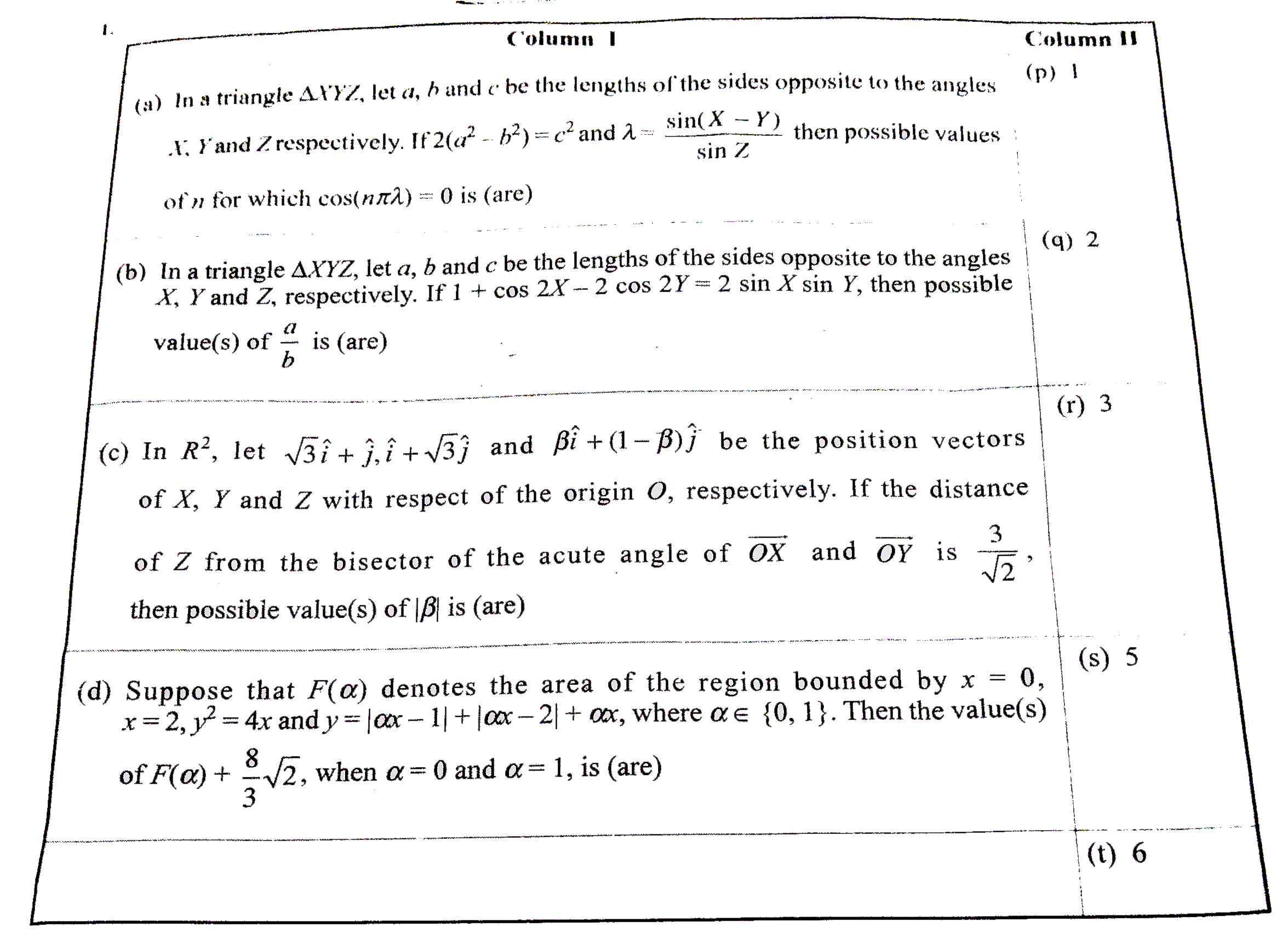Let S={(x,y)∈R2:y21+r−x21−r=1}, where r≠±1. Then S represents: Solution in Bengali
A hyperbolawhose eccentricity is 2√r+1, where 0<r<1.
An ellipse whose eccentricity is 1√r+1, wherer>1
A hyperbola whose eccentricity is 2√1−r, where 0<r<1.
An ellipse whose eccentricity is √2r+1, where r>1.
The correct Answer is:D
Step by step video & image solution for Let S={(x,y) in R^(2):(y^(2))/(1+r)-(x^(2))/(1-r)=1}, where r ne pm 1. Then S represents: by Maths experts to help you in doubts & scoring excellent marks in Class 12 exams.
Updated on:21/07/2023Topper's Solved these Questions
- JEE 2019BOOK - CENGAGE PUBLICATIONCHAPTER - JEE 2019EXERCISE - Matching coluumn type
1 Videos
- JEE 2019BOOK - CENGAGE PUBLICATIONCHAPTER - JEE 2019EXERCISE - Integer Answer type
2 Videos
- JEE 2019BOOK - CENGAGE PUBLICATIONCHAPTER - JEE 2019EXERCISE - Chapter 6 (Ellipse)
3 Videos
- INVERSE TRIGONOMETRIC FUNCTIONSBOOK - CENGAGE PUBLICATIONCHAPTER - INVERSE TRIGONOMETRIC FUNCTIONSEXERCISE - All Questions
541 Videos
- LIMITSBOOK - CENGAGE PUBLICATIONCHAPTER - LIMITSEXERCISE - Comprehension Type
4 Videos
Similar Questions

View SolutionSuppose that →p,→qand→r are three non- coplaner in R3 ,Let the components of a vector→s along →p,→qand→r be 4,3, and 5, respectively , if the components this vector →s along (−→p+→q+→r),(→p−→q+→r)and(−→p−→q+→r) are x, y and z , respectively , then the value of 2x+y+z is
View SolutionIf normals are drawn to the ellipse x2+2y2=2 from the point (2,3). then the co-normal points lie on the curve
View SolutionFind x satisfying [tanx]+[cotx]=2, where [.] represents the greatest integer function.
View Solutionlimx→0sin2xx
View SolutionThe equation x21−r−y21+r=1,r>1, represents (a)an ellipse (b) a hyperbola (c)a circle (d) none of these
View Solutionif x,y,r and s are positive real no's.such that x^(2)+y^(2)=r^(2)+s^(2)=1, then max value of xr+ys
View SolutionLet R={(x,y):x^(2)+y^(2)=1,x,y in R} be a relation in R. Then the relation R is
View SolutionLet S be the set of circles x2+y2=r2 for r=1, 2 and 3 and T be the set of lines y=x+k√2 for k=0,≠1and±2. Find the number of distinct points of intersection of the graphs of set S and T.
View SolutionLet S={(x,y)∈R2:y21+r−x21−r=1}, where r≠±1. Then S represents:
View Solution|(.^(x)C_(r),.^(x)C_(r+1),.^(y)C_(r+2)),(.^(y)C_(r),.^(x)C_(r+1),.^(y)C_(r+2)),(.^(z)C_(r),.^(z)C_(r+1),.^(z)C_(r+2))|+|(.^(x)C_(4),.^(x+1)C_(r+1),.^(x+2)C_(r+2)),(.^(y)C_(4),.^(y+1)C_(r+1),.^(y+2)C_(r+2)),(.^(z)C_(4),.^(z+1)C_(r+1),.^(z+2)C_(r+2))|=
View SolutionProve that - |(.^(x)C_(y),.^(x)C_(r+1),.^(x)C_(r+2)),(.^(y)C_(r),.^(y)C_(r+1),.^(y)C_(r+2)),(.^(z)C_(r),.^(z)C_(r+1),.^(z)C_(r+2))|=|(.^(x)C_(r),.^(x+1)C_(r+1),.^(x+2)C_(r+2)),(.^(y)C_(r),.^(y+1)C_(r+1),.^(y+2)C_(r+2)),(.^(z)C_(r),.^(z+1)C_(r+1),.^(z+2)C_(r+2))|
View Solutionमाना S={(x,y)∈R2:y21+r−x21−r=1} जहाँ r≠+1 है, तो S किसे निरूपित करता है
View Solutionagreed R={(x,y): x^2+y^2=1,x ,y in R} There is a relation on the set R, then
View SolutionLet f:R−{1}→R be defined by
f(x)=1+x1−x∀x∈R−{1} then for x≠±1,1+f(x)2f(x)f(x2)=………….
View SolutionThe number of elements in the set A∩B∩C, where
A={(x,y)∈R×R,|x|+|y|≥1}
B={(x,y)∈R×R,x2+y2≥1}
and C={(x,y)∈R×R: max |x|,|y|=1} is:
View Solution
